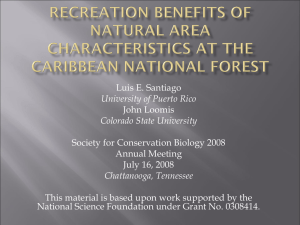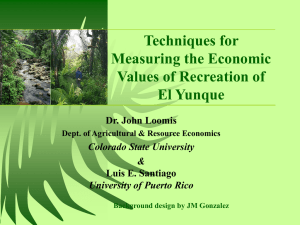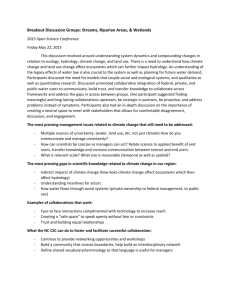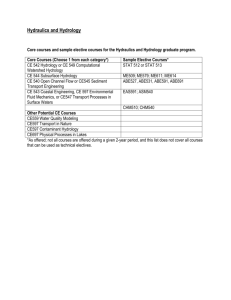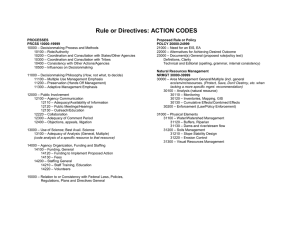University of Puerto Rico Colorado State University Hydrology Days 2008 Fort Collins, Colorado
advertisement
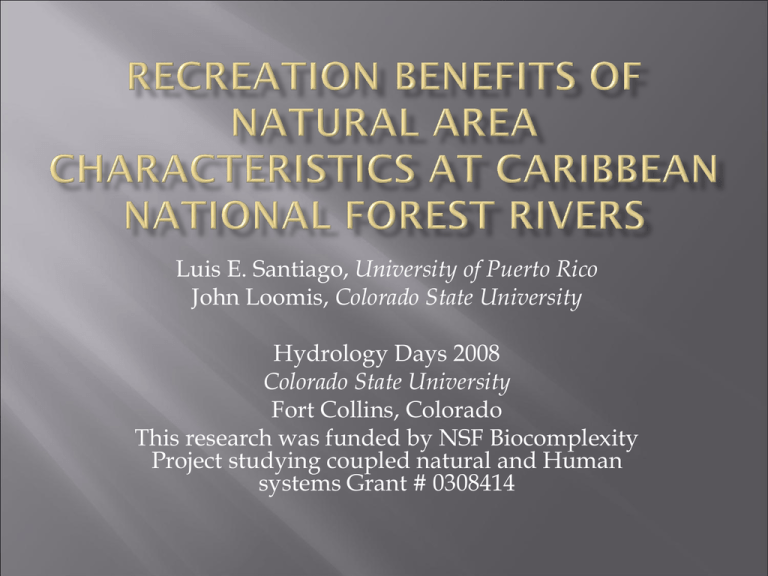
Luis E. Santiago, University of Puerto Rico
John Loomis, Colorado State University
Hydrology Days 2008
Colorado State University
Fort Collins, Colorado
This research was funded by NSF Biocomplexity
Project studying coupled natural and Human
systems Grant # 0308414
Natural Resource Managers often need to
know:
Value of Protecting Natural Features such as
Waterfalls from hydropower development
Added value of providing visitor access to Natural
Features such as Waterfalls as road construction to
waterfall areas can be expensive
Added value of providing trails at recreation areas,
as trail construction & maintenance is also expensive
To provide economic valuation information on
incremental value of recreation with waterfalls
and trails
Illustrate how the Contingent Valuation
Method can be applied to not only provide:
An overall value of current recreation
How that value changes with presence of waterfalls
and construction of hiking trails
WTPit = (A1i, . . . , Ani, D1i , . . . , Dni )
WTPit = net benefits (willingness to pay) from recreation
experience
A1i, . . . , Ani = built and natural site attributes such as scenic
views, the presence of waterfalls, availability of parking spots and
the presence of foot trails
D1i, D2i , . . . , Dni = demographic characteristics of the visitor,
including gender, age, level of education, and annual income
i = individual respondent to survey
t = date
Hydrology Days 2008
4
Data Collection Mode
In-person interviews at recreation site while visitors
were recreating
The interviewers were trained graduate and
undergraduate students who closely followed a
script.
Sample size
1,126 questionnaires
99% response rate
Hydrology Days 2008
5
Information Component of Survey Instrument
Item to be valued: recreation site
Payment vehicle: recreation trip cost
Time frame of payment: PER TRIP
Hydrology Days 2008
6
Contingent Valuation Question
Response format: Dichotomous-choice
Question: As you know the price of gasoline often goes
up. Taking into consideration that there are other rivers as
well as beaches nearby where you could go visit, if the cost
of this visit to this river was $____ more than what you
have already spent, would you still have come today?
____ Yes
____ No
The bid amount randomly presented to respondents
began at $5, and ranged up to $160.
35 respondents evaluated each bid amount.
Hydrology Days 2008
7
8
River
Number of Observations
Espiritu
Santo
Fajardo
Mameyes
164
235
593
92.7
87.6
84.5
Natural and Built Site Variables
Average Temperature (in ºF)
Presence of Waterfalls
3 of 5 sites
2 of 5 sites 2 of 7 sites
Presence of Scenic Views
3 of 5 sites
3 of 5 sites 5 of 7 sites
Presence of Formal Trails
1 of 5 sites
0 of 5 sites 2 of 7 sites
Hydrology Days 2008
9
Probability (YES) =
1 - {1 + exp[β0 - β1(X) + βA (A) + βD (D)]}
Where:
β0 = the intercept.
β1 = the coefficient on the bid variable,
X = the given bid amount,
βA = the coefficient on the built and natural site
attributes (An), and
βD = the coefficient on the demographic
variables (Dn).
Hydrology Days 2008
10
Variable
Constant
BID ($)
WATERFALL
FOOT TRAILS
EDUCATION
GENDER
Coefficient z-Statistic
1.1375
5.572
-0.0094
-13.59
0.2126
2.1485
0.1774
1.6924
-0.0234
-1.6865
0.1775
2.154
Hydrology Days 2008
Prob.
0.0000
0.0000
0.0317
0.0906
0.0917
0.0312
11
Constant WFALL FTRAILS EDUC GENDER
$119.95 $23.07 $19.24 -$2.49 $19.69
The median net economic value of a visit to the
two rivers without waterfalls or foot trails is
$96.
Recreation at rivers with both waterfalls and
foot trails has a median value of $138 per trip.
The presence of waterfalls accounts for $23 and
foot trails $19 per trip.
Hydrology Days 2008
13
This information can be pertinent for managers
Selecting recreation site locations.
Protecting sites from competing uses, such as
locations with sufficient gradient for waterfalls, also
coveted by others for hydropower development.
Improving existing site facilities
Only 3 of 17 sites have formal trails.
Some sites, especially outside the CNF, don’t have
adequate parking, picnic areas , regular trash collection.
Hydrology Days 2008
14
